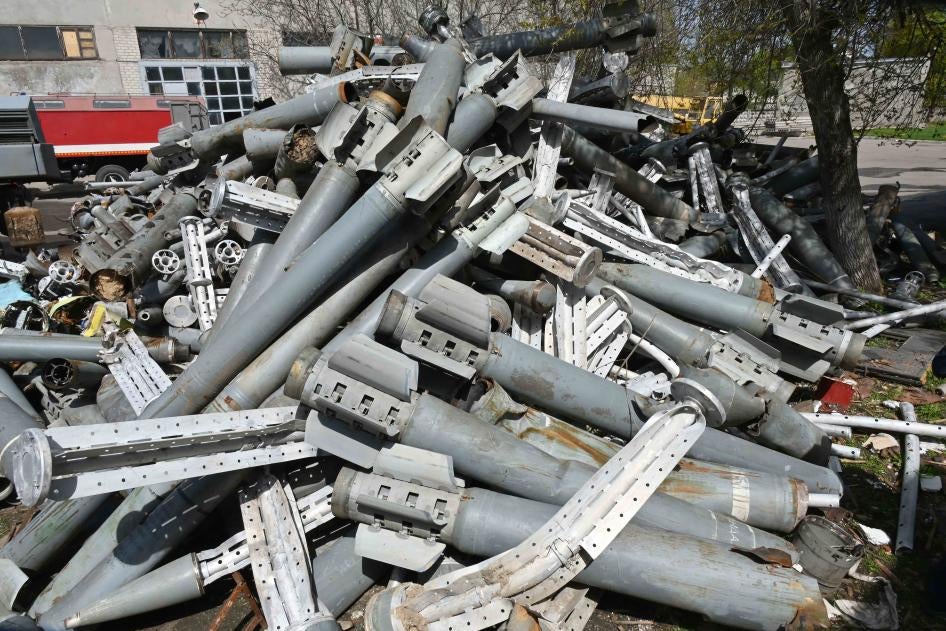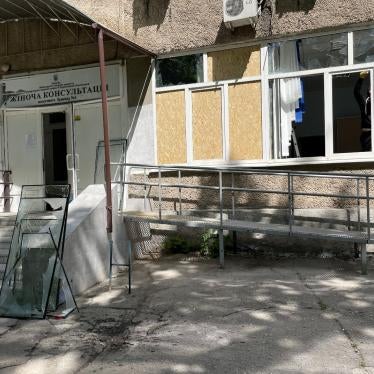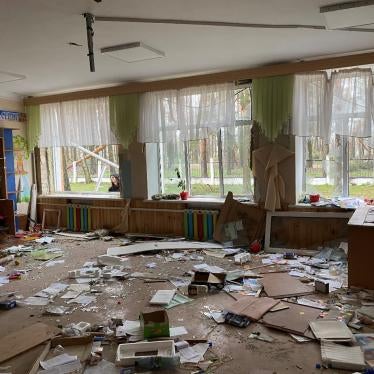- Russian forces’ repeated use of cluster munitions has caused predictable and lasting harm to hundreds of Ukrainian civilians, the Cluster Munition Monitor 2022 reported.
- Cluster munitions disperse dangerous submunitions that can maim and kill like landmines for years, until they are cleared and destroyed.
- Governments that have yet to join the cluster munitions treaty – ratified by 110 countries and signed by 13 more – should review their position and help rid the world of cluster munitions.
(Geneva, August 25, 2022) – Russian forces’ repeated use of cluster munitions has caused predictable and lasting harm to hundreds of Ukrainian civilians, Human Rights Watch said today in releasing the 100-page global Cluster Munition Monitor 2022 report. Both Russia and Ukraine should reject the use of cluster munitions and join the 2008 international treaty banning them.
Ukraine is the only country in the world where cluster munitions are being used today, Human Rights Watch said. Hundreds of Russian cluster munition attacks have been documented, reported, or alleged in at least 10 of Ukraine’s 24 regions, or oblasts. Preliminary data shows at least 689 civilian casualties from cluster munition attacks in Ukraine between February and July 2022. Ukrainian forces also appear to have used cluster munitions rockets on at least two occasions.
“The immediate and long-term suffering that cluster munitions cause civilians make their use today in Ukraine unconscionable as well as invariably unlawful,” said Mary Wareham, arms advocacy director at Human Rights Watch and editor of the Cluster Munition Monitor 2022. “All countries should condemn the use of these weapons under any circumstances.”
Cluster munitions can be fired from the ground by artillery, rockets, and mortars, or dropped by aircraft. They typically open in the air, dispersing multiple bomblets or submunitions over a wide area. Many submunitions fail to explode on initial impact, leaving dangerous duds that can indiscriminately maim and kill like landmines for years, until they are cleared and destroyed.
A Human Rights Watch investigation in Kharkiv, Ukraine’s second-largest city, found that in May and June, Russian forces launched cluster munition rockets whose submunitions struck homes, city streets, and parks, as well as an outpatient clinic at a maternity hospital and a cultural center. A May 12 attack on the nearby town of Derhachi instantly killed a woman cooking in her garden and severed the legs of her husband, who died hours later.
The 2008 Convention on Cluster Munitions, which 110 countries have ratified and 13 more have signed, comprehensively prohibits these weapons. There have been no confirmed reports or allegations of new use, production, or transfers of cluster munitions by any state party since the convention was adopted on May 30, 2008. However, no country has ratified the convention since 2020, and neither Russia nor Ukraine are parties.
Cluster Munition Monitor 2022 tracks efforts to eradicate cluster munitions by all countries, regardless of whether they have joined the treaty. In 2021, for the first time in a decade, no new casualties from cluster munition attacks were recorded, although there were 147 new cluster munition casualties in eight countries from cluster munition remnants. Children accounted for two-thirds of all casualties for which the age of victims was recorded. This notable decline in new cluster munition casualties has been eclipsed by the new use in Ukraine since February 2022.
Human Rights Watch found that the strict standard set by the Convention on Cluster Munitions has affected government development and acquisition plans as cluster munitions are being phased out of service in many of the 47 countries with stocks that have not joined the convention.
In 2022, Russia has used both stocks of old cluster munitions and newly developed ones in Ukraine. There’s no evidence to suggest cluster munitions, as defined by the convention, have been transferred among the artillery, rocket systems, and other weapons that the Ukrainian government has received from third parties in 2022.
Other military powers have bucked the positive trend away from cluster munitions. China and Iran are actively researching and developing new types of cluster munitions.
The United States last manufactured cluster munitions in 2016 but has not joined the international ban or committed to never produce them in the future.
Under the convention, 37 countries that once possessed cluster munitions have destroyed their stocks, collectively destroying nearly 1.5 million cluster munitions containing 178 million submunitions. The total is 99 percent of all cluster munitions that parties to the convention have reported stockpiling.
In 2021 and the first half of 2022, Bulgaria, Peru, and Slovakia destroyed at least 1,658 cluster munitions and 46,733 submunitions from their stockpiles. Under the convention, countries contaminated by cluster munition remnants cleared more than 58 square kilometers of affected land in 2021, destroying at least 78,424 submunitions and cluster munition remnants.
The Cluster Munition Monitor is the annual monitoring report by the Cluster Munition Coalition (CMC), the global coalition of nongovernmental organizations co-founded and chaired by Human Rights Watch. The report will be presented to countries attending the 10th annual meeting of the Convention on Cluster Munitions at the United Nations in Geneva on August 30-September 2.
“Russia’s widespread use of cluster munitions in Ukraine is a sobering reminder of what the convention needs to overcome if it is to succeed in ending the human suffering these indiscriminate weapons cause,” Wareham said. “Governments that have yet to join the convention should review their position and join with others helping to rid the world of cluster munitions.”









